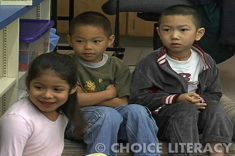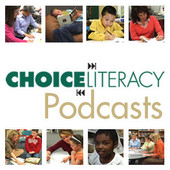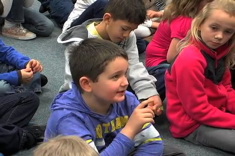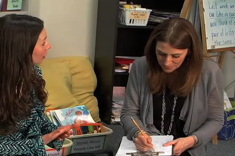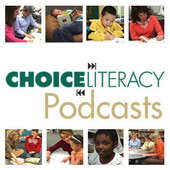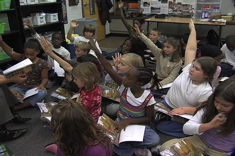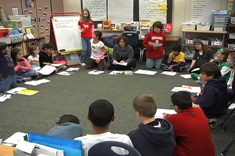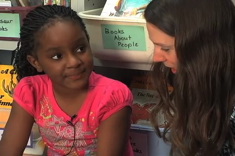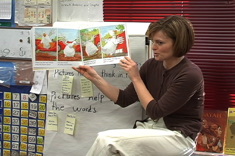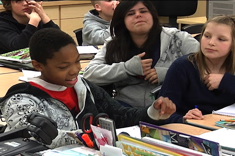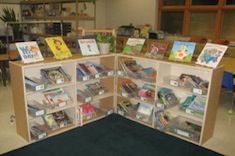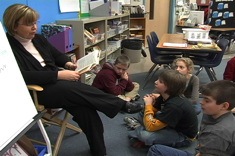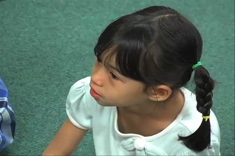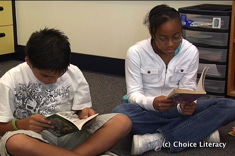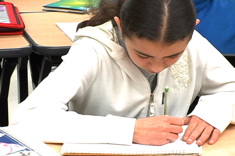Articles
Here is where you’ll find all the latest print features from our contributors. If you’d like to browse specifically by grade level, topic, or contributor, you can use the links in the right sidebar.
Latest Content
Getting to Know Multilingual Learners at the Start of the Year
If you’re unsure about working with multilingual learners, Stella Villalba has some reassuring advice for you.
Jennifer Allen on Working with New Teachers (PODCAST)
New teachers need thoughtful support – Jennifer Allen has suggestions on how to provide that assistance in this podcast.
Our Learning Goals: Planning at the Start of the Year
As educators, we are always learning and growing. We asked colleagues and Choice Literacy contributors to share with us the goals they set this year.
Teaching Students Retelling Strategies
Retelling is an essential skill for readers, and it’s one that is crucial for success on most state exams too. In Part 1 of a two-part series, Clare Landrigan and Tammy Mulligan share strategies and sample lessons.
An Uncommon Place
A mulberry tree crashes during a blizzard, creating a surprisingly lovely mental space for Shirl McPhillips to craft her poem.
Supporting Successful First-Year Coaches
Heather Rader gets the inside word from novice literacy coaches about the support they need to thrive.
Make it Personal
The connections we make with students and families are what we remember most when all is said and done. Trish Prentice has thoughts on what changes a respected teacher into a beloved teacher.
Jennifer Allen on Working with Veteran Teachers (PODCAST)
Jennifer Allen has developed some innovative support systems for veteran teachers. She shares her insights in this podcast.
Life on the Edge
"Life on the Edge" compares the energy and purpose of birds in a nest to daily life in classrooms. It's the perfect metaphor for the fast pace of our teaching lives.
Next Steps: Thinking about Retelling During Reading
Retelling is an essential skill for readers, and it’s one that is crucial for success on most state exams too. In Part 2 of a two-part series, Clare Landrigan and Tammy Mulligan share strategies and sample lessons in this installment.
Digital Handouts: An Alternative to More Paper and Meetings
Jill Ostrow creates a flexible and practical online tool to support teachers of English language learners.
Read Alouds for the Last Days of School
Choice Literacy readers share some of their favorite read alouds for the last days of school.
Injecting Writing into Everything: Prediction Stories
What happens between kindergarten and upper elementary grades to make students more hesitant about making predictions? Heather Rader has books and teaching suggestions for building prediction skills.
Coaching Out of Chaos: Helping New Teachers Establish Management Systems
The #1 issue for many new teachers is management. Heather Rader shares how she tactfully assisted a novice teacher who needed help.
Using Series Books to Model Comprehension and Anchor Thinking
Katie DiCesare shares some of her favorite texts for a primary study on series books. This is Part 2 in a series.
Uncovering Reading Behaviors
Teachers value the assessment of student skills and needs that come from close observation in classrooms, but may not know how to focus those observations. Ruth Shagoury documents some of those behaviors that put students on the path of becoming accomplished independent readers in a middle school classroom.
Daily Tidbits: Professional Development in Small Bites
Jennifer Jones suggests an easy way to provide bits of useful professional development to colleagues.
Literacy Keepsakes to Carry Home at the End of the School Year
Choice Literacy readers share their favorite gifts for students to make and take home at the end of the year.
Creating a Kindergarten Classroom Library
Mandy Robek finds herself overwhelmed when moving from a 3rd grade to kindergarten classroom. Her therapy? Rolling up her sleeves and designing a kindergarten classroom library.
Who Rules?: Creating a Classroom Code of Conduct with Students
Heather Rader works with a young teacher to establish a better management system.
Still Revising After 10 Years: Sorting Through Pitfalls of Study Groups
Jennifer Allen considers how her study groups have changed over the past decade as she continues to balance district demands with teacher choice.
Books and Activities from Around the World to Celebrate the Holiday Season
People around the world celebrate the holidays in different ways, and that diversity provides wonderful learning opportunities this time of year. Stella Villalba shares literary holiday projects and a booklist around the themes of “peace” and “wishes” that might help students find common ground in family traditions.
Books to Celebrate Earth Day
Earth Day in April is a great time to get outdoors with a good book! Franki Sibberson shares some of her favorite texts linked to Earth Day.
Getting Started with a Teacher Blog
Karen Terlecky shares practical tips for starting a teacher blog.
Reflections on a Year of Read Alouds
Karen Terlecky mulls over a year of read alouds in her 5th grade classroom as she makes plans for the coming year.
Guiding Readers in Kindergarten: A Planning and Assessment Template
If you’re considering guided reading groups in your kindergarten classroom, you’ll want to read Mandy Robek’s advice for getting started and keeping track with a simple planning and assessment form.
A District Film Festival: Giving Kids An Authentic Audience for Their Work
Lights, cameras, and even a red carpet! Bill Bass documents how a film festival brought high school teachers and students together, with a strong focus on connecting district goals and standards to the fun projects.
Literacy Rights and Responsibilities
Something bad was happening in Katie Doherty’s middle school classroom—it was time to rebuild the class community with a reality check.
Writing and Publishing Book Reviews with Middle School Students
What teenager doesn't enjoy critiquing everything in the world? Erin Ocon puts that judgmental passion to good use in her classroom with a book review assignment.
A Congenial Parent Night
Invigorate your parent night with these suggestions from Trish Prentice.
Browse Content By
Type
Category
- Assessment Tools
- Big Fresh Archives
- Booklists
- Choice Numeracy
- Classroom Design
- Common Core
- Community Building
- Conferring
- Content Literacy
- Digital Literacy
- English Language Learners
- Equity
- Family Relations
- Free Samples
- Guiding Groups
- Leadership
- Literacy Coaches
- Mentor Texts
- Minilessons
- New Teacher Mentors
- Podcasts
- Poetry
- Quote Collections
- Reading Strategies
- Self Care
- Struggling and Striving Learners
- Talking and Listening
- Teacher Study Groups
- Teaching Reading
- Teaching Writing
- Word Study and Vocabulary
Author
- Melissa Quimby
- Nawal Qarooni
- Gwen Blumberg
- Julie Cox
- The Lead Learners
- Hannah Tills
- Josie Stewart
- Ruth Metcalfe
- Mallory Messenger
- Becca Burk
- Jodie Bailey
- Vivian Chen
- Mary Brower
- Tiffany Abbott Fuller
- Stephanie Affinito
- Ruth Ayres
- Leigh Anne Eck
- Heather Fisher
- Shari Frost
- Julie Johnson
- Suzy Kaback
- Gigi McAllister
- Shirl McPhillips
- Melanie Meehan
- Cathy Mere
- Debbie Miller
- Tara Barnett and Kate Mills
- Tammy Mulligan
- Dana Murphy
- Bitsy Parks
- David Pittman
- Brenda Power
- Heather Rader
- Matt Renwick
- Mandy Robek
- Christy Rush-Levine
- Gretchen Schroeder
- Jen Schwanke
- Brian Sepe
- Katherine Sokolowski
- Stella Villalba
- Jennifer Vincent
Grade Level
Choice Literacy Membership
Articles
Get full access to all Choice Literacy article content
Videos
Get full access to all Choice Literacy video content
Courses
Access Choice Literacy course curriculum and training

